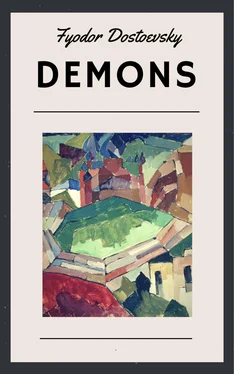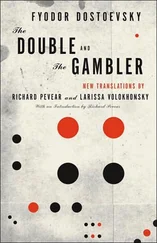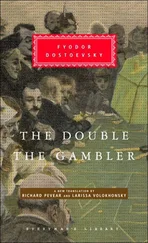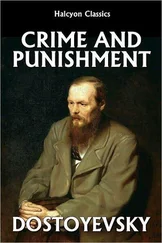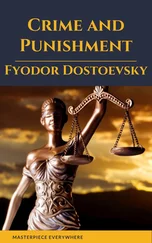“You have a very peculiar way of looking at things, anyhow,” Nikolay went on, “but as for Agafya, I understand, of course, that you simply sent her to be rude to me.”
“I couldn’t challenge you to a duel, could I?”
“Oh, no, of course! I seem to have heard that you’re not fond of duels.…”
“Why borrow from the French?” said Liputin, doubling up again.
“You’re for nationalism, then?”
Liputin shrank into himself more than ever.
“Bah, bah! What do I see?” cried Nicolas, noticing a volume of Considérant in the most conspicuous place on the table. “You don’t mean to say you’re a Fourierist! I’m afraid you must be! And isn’t this too borrowing from the French?” he laughed, tapping the book with his finger.
“No, that’s not taken from the French,” Liputin cried with positive fury, jumping up from his chair. “That is taken from the universal language of humanity, not simply from the French. From the language of the universal social republic and harmony of mankind, let me tell you! Not simply from the French!”
“Foo! hang it all! There’s no such language!” laughed Nikolay.
Sometimes a trifle will catch the attention and exclusively absorb it for a time. Most of what I have to tell of young Stavrogin will come later. But I will note now as a curious fact that of all the impressions made on him by his stay in our town, the one most sharply imprinted on his memory was the unsightly and almost abject figure of the little provincial official, the coarse and jealous family despot, the miserly money-lender who picked up the candle-ends and scraps left from dinner, and was at the same time a passionate believer in some visionary future “social harmony,” who at night gloated in ecstasies over fantastic pictures of a future phalanstery, in the approaching realisation of which, in Russia, and in our province, he believed as firmly as in his own existence. And that in the very place where he had saved up to buy himself a “little home,” where he had married for the second time, getting a dowry with his bride, where perhaps, for a hundred miles round there was not one man, himself included, who was the very least like a future member “of the universal human republic and social harmony.”
“God knows how these people come to exist!” Nikolay wondered, recalling sometimes the unlooked-for Fourierist.
IV
Our prince travelled for over three years, so that he was almost forgotten in the town. We learned from Stepan Trofimovitch that he had travelled all over Europe, that he had even been in Egypt and had visited Jerusalem, and then had joined some scientific expedition to Iceland, and he actually did go to Iceland. It was reported too that he had spent one winter attending lectures in a German university. He did not write often to his mother, twice a year, or even less, but Varvara Petrovna was not angry or offended at this. She accepted submissively and without repining the relations that had been established once for all between her son and herself. She fretted for her “Nicolas” and dreamed of him continually. She kept her dreams and lamentations to herself. She seemed to have become less intimate even with Stepan Trofimovitch. She was forming secret projects, and seemed to have become more careful about money than ever. She was more than ever given to saving money and being angry at Stepan Trofimovitch’s losses at cards.
At last, in the April of this year, she received a letter from Paris from Praskovya Ivanovna Drozdov, the widow of the general and the friend of Varvara Petrovna’s childhood. Praskovya Ivanovna, whom Varvara Petrovna had not seen or corresponded with for eight years, wrote, informing her that Nikolay Vsyevolodovitch had become very intimate with them and a great friend of her only daughter, Liza, and that he was intending to accompany them to Switzerland, to Verney-Montreux, though in the household of Count K. (a very influential personage in Petersburg), who was now staying in Paris. He was received like a son of the family, so that he almost lived at the count’s. The letter was brief, and the object of it was perfectly clear, though it contained only a plain statement of the above-mentioned facts without drawing any inferences from them. Varvara Petrovna did not pause long to consider; she made up her mind instantly, made her preparations, and taking with her her protégée, Dasha (Shatov’s sister), she set off in the middle of April for Paris, and from there went on to Switzerland. She returned in July, alone, leaving Dasha with the Drozdovs. She brought us the news that the Drozdovs themselves had promised to arrive among us by the end of August.
The Drozdovs, too, were landowners of our province, but the official duties of General Ivan Ivanovitch Drozdov (who had been a friend of Varvara Petrovna’s and a colleague of her husband’s) had always prevented them from visiting their magnificent estate. On the death of the general, which had taken place the year before, the inconsolable widow had gone abroad with her daughter, partly in order to try the grape-cure which she proposed to carry out at Verney-Montreux during the latter half of the summer. On their return to Russia they intended to settle in our province for good. She had a large house in the town which had stood empty for many years with the windows nailed up. They were wealthy people. Praskovya Ivanovna had been, in her first marriage, a Madame Tushin, and like her school-friend, Varvara Petrovna, was the daughter of a government contractor of the old school, and she too had been an heiress at her marriage. Tushin, a retired cavalry captain, was also a man of means, and of some ability. At his death he left a snug fortune to his only daughter Liza, a child of seven. Now that Lizaveta Nikolaevna was twenty-two her private fortune might confidently be reckoned at 200,000 roubles, to say nothing of the property—which was bound to come to her at the death of her mother, who had no children by her second marriage. Varvara Petrovna seemed to be very well satisfied with her expedition. In her own opinion she had succeeded in coming to a satisfactory understanding with Praskovya Ivanovna, and immediately on her arrival she confided everything to Stepan Trofimovitch. She was positively effusive with him as she had not been for a very long time.
“Hurrah!” cried Stepan Trofimovitch, and snapped his fingers.
He was in a perfect rapture, especially as he had spent the whole time of his friend’s absence in extreme dejection. On setting off she had not even taken leave of him properly, and had said nothing of her plan to “that old woman,” dreading, perhaps, that he might chatter about it. She was cross with him at the time on account of a considerable gambling debt which she had suddenly discovered. But before she left Switzerland she had felt that on her return she must make up for it to her forsaken friend, especially as she had treated him very curtly for a long time past. Her abrupt and mysterious departure had made a profound and poignant impression on the timid heart of Stepan Trofimovitch, and to make matters worse he was beset with other difficulties at the same time. He was worried by a very considerable money obligation, which had weighed upon him for a long time and which he could never hope to meet without Varvara Petrovna’s assistance. Moreover, in the May of this year, the term of office of our mild and gentle Ivan Ossipovitch came to an end. He was superseded under rather unpleasant circumstances. Then, while Varvara Petrovna was still away, there followed the arrival of our new governor, Andrey Antonovitch von Lembke, and with that a change began at once to be perceptible in the attitude of almost the whole of our provincial society towards Varvara Petrovna, and consequently towards Stepan Trofimovitch. He had already had time anyway to make some disagreeable though valuable observations, and seemed very apprehensive alone without Varvara Petrovna. He had an agitating suspicion that he had already been mentioned to the governor as a dangerous man. He knew for a fact that some of our ladies meant to give up calling on Varvara Petrovna. Of our governor’s wife (who was only expected to arrive in the autumn) it was reported that though she was, so it was heard, proud, she was a real aristocrat, and “not like that poor Varvara Petrovna.” Everybody seemed to know for a fact, and in the greatest detail, that our governor’s wife and Varvara Petrovna had met already in society and had parted enemies, so that the mere mention of Madame von Lembke’s name would, it was said, make a painful impression on Varvara Petrovna. The confident and triumphant air of Varvara Petrovna, the contemptuous indifference with which she heard of the opinions of our provincial ladies and the agitation in local society, revived the flagging spirits of Stepan Trofimovitch and cheered him up at once. With peculiar, gleefully-obsequious humour, he was beginning to describe the new governor’s arrival.
Читать дальше
